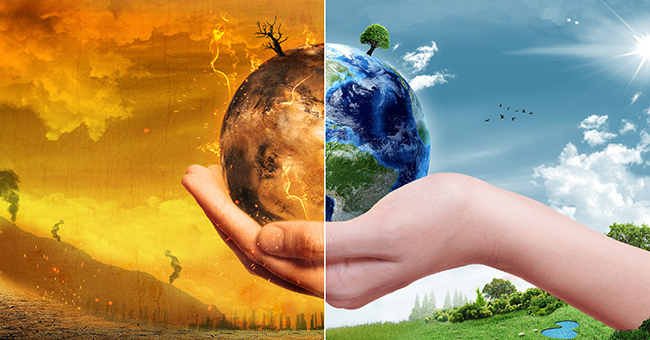Introduction:
Climate change is one of the most pressing issues facing our world today. It is a global crisis that affects everyone, regardless of age, race, or nationality. This article will explore the causes and effects of climate change, as well as the actions that individuals, governments, and businesses can take to address this urgent issue.
Table of Contents:
The Science of Climate Change
- The Greenhouse Effect
- Carbon Dioxide Emissions
- The Role of Human Activity
Impacts of Climate Change
- Rising Sea Levels
- Increased Frequency of Extreme Weather Events
- Biodiversity Loss
Political and Economic Implications
- Climate Change Policies and Agreements
- Economic Impacts of Climate Change
- Climate Change and Social Justice
Addressing Climate Change
- Mitigation Strategies
- Adaptation Strategies
- Individual Actions
The Science of Climate Change:
The Greenhouse Effect:
The greenhouse effect is a natural process that occurs when gases in the Earth's atmosphere trap heat from the sun, which keeps the planet warm. However, human activities, such as burning fossil fuels, have increased the concentration of greenhouse gases in the atmosphere, leading to a significant increase in global temperatures.
Carbon Dioxide Emissions:
Carbon dioxide is one of the most significant greenhouse gases. The burning of fossil fuels, deforestation, and industrial processes are the primary sources of carbon dioxide emissions. The concentration of carbon dioxide in the atmosphere has increased by 47% since the Industrial Revolution.
The Role of Human Activity:
Human activities, particularly the burning of fossil fuels, have been identified as the primary cause of climate change. The Intergovernmental Panel on Climate Change (IPCC) states that human activities have caused the Earth's temperature to increase by 1.1°C above pre-industrial levels.
Impacts of Climate Change:
Rising Sea Levels:
As temperatures rise, glaciers and ice caps melt, causing sea levels to rise. This rise in sea level poses a significant threat to coastal communities, as well as the world's economy. In 2019, the IPCC estimated that sea levels could rise by up to 1 meter by the end of the century, putting millions of people at risk.
Increased Frequency of Extreme Weather Events:
Climate change is causing an increase in the frequency and intensity of extreme weather events, such as heatwaves, droughts, hurricanes, and floods. These events have devastating consequences, including loss of life, displacement, and economic damage.
Biodiversity Loss:
Climate change is also causing significant biodiversity loss, as many species struggle to adapt to rapidly changing environmental conditions. In 2019, the Intergovernmental Science-Policy Platform on Biodiversity and Ecosystem Services (IPBES) reported that up to 1 million species are at risk of extinction due to human activity.
Political and Economic Implications:
Climate Change Policies and Agreements:
International agreements, such as the Paris Agreement, aim to limit global warming to well below 2°C above pre-industrial levels. However, many countries have not taken adequate action to achieve these goals, and the United States, one of the largest emitters of greenhouse gases, withdrew from the agreement in 2020.
Economic Impacts of Climate Change:
Climate change has significant economic impacts, including increased costs associated with extreme weather events and the loss of industries reliant on natural resources. In 2020, the World Bank estimated that the global cost of adapting to climate change could be between $70 billion and $100 billion per year.
Climate Change and Social Justice:
Climate change disproportionately affects marginalized communities, including low-income communities, communities of color, and Indigenous communities. These communities often have less access to resources and are more vulnerable to the impacts of climate change, such as sea level rise and extreme weather events. Addressing climate change must also involve addressing social justice issues and ensuring that all communities are included in climate action plans.
Addressing Climate Change:
Mitigation Strategies:
Mitigation strategies aim to reduce greenhouse gas emissions to prevent further warming of the planet. These strategies include transitioning to renewable energy sources, implementing energy-efficient buildings and transportation, and reducing deforestation and land use change. Governments, businesses, and individuals can all play a role in implementing these strategies.
Adaptation Strategies:
Adaptation strategies aim to reduce the impacts of climate change that are already happening or are inevitable. These strategies include building sea walls and other infrastructure to protect coastal communities from sea level rise, implementing drought-resistant crops, and improving water management in areas affected by drought.
Individual Actions:
Individuals can take action to reduce their carbon footprint and contribute to addressing climate change. This includes reducing energy consumption by turning off lights and unplugging electronics, using public transportation or electric vehicles, and reducing meat consumption.
Conclusion:
Climate change is a global crisis that requires urgent action from governments, businesses, and individuals. The impacts of climate change, including rising sea levels, extreme weather events, and biodiversity loss, will have significant consequences for our planet and its inhabitants. Mitigation and adaptation strategies, along with individual actions, can help address this urgent issue and create a more sustainable future. It is essential to prioritize climate action and work towards a world that is resilient to the impacts of climate change while also promoting social justice and equity for all.


Comments
Post a Comment